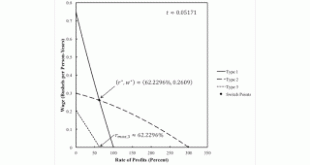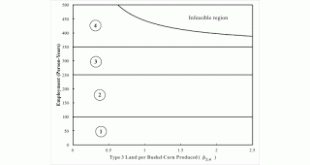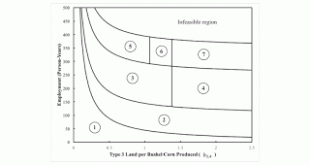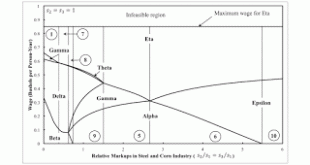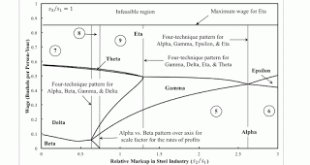"I know not how I may seem to the world, but as to myself I seem to have been only like a boy playing on the sea-shore and diverting myself in now and then finding a smoother pebble or a prettier shell than ordinary, whilst the great ocean of truth lay all undiscovered before me." -- Isaac Newton (apocryphal?) For the past couple of years, I have been pursuing a research program that I seem to have stumbled upon. I am looking for fluke switch points, where these fluke switch points...
Read More »Fluke Cases for the Order of Fertility
Figure 1: Wage Curves for Fluke Case for r-Order of Fertility1.0 Introduction This post illustrates two fluke cases that can arise in a model with land and extensive rent. I call these a pattern of switch points for the r-order of fertility and a pattern of switch points for the w- order of fertility. I have previously described a fluke case in the order of rentability, which can be either over the wage axis or over the axis for the rate of profits. These fluke cases can arise in an...
Read More »Engels to Sombart in 1895
This transcription is taken from here. Dear Sir: Replying to your note of the 14th of last month, may I thank you for your kindness in sending me your work on Marx; I had already read it with great interest in the issue of the Archiv which Dr. H. Braun was good enough to send me, and was pleased for once to find such understanding of Capital at a German University. Naturally I can't altogether agree with the wording in which you render Marx’s exposition. Especially the definitions of...
Read More »Flukes In A Modification Of An Example With Land
Figure 1: A Partition of a Slice of the Parameter Space1.0 Introduction This post presents another example from Woods (1990). It is a modification of this example. That previous example demonstrates that the order of fertility - the order in which lands of various types and that support different processes of production are taken into cultivation - varies with distribution. If the wage were different, the order of fertility could be different. Furthermore, the order of rentability - the...
Read More »Does The Existence Of Wine Refute The Labor Theory Of Value?
[embedded content]Victor Magarino Debating "Ubersoy" On The Labor Theory Of Value The above is one in a series (Richard Wolff versus "Destiny", Slavoj Zizek versus Jordan Peterson) in which the pro-capitalist/anti-socialist side is represented by somebody seemingly almost completely ignorant of the topic they are pretending to discuss. Magarino needs a better interlocutor. I can find some related debates on YouTube with a more level playing field. That said, I think Magarino needs a...
Read More »Flukes In An Example With Land
Figure 1: A Partition of a Slice of the Parameter Space1.0 Introduction This post tells a story in which owners of a certain type of land find the amount of their land needed to produce net output declines. Wages stay constant, and the rent for some landlords increases. This example is generalized from Woods (1990). 2.0 Technology This an example (Table 1) of a capitalist economy in which two commodities, iron and corn, are produced. One process is known for producing iron. In the iron...
Read More »Elsewhere
[embedded content]A History Lecture Focusing on Cantor, Dedekind, Gödel, Turing, etc.Norman Wildberger's next video in the above series is here. This professor, who has some dissenting views, explicitly tells his class that he does not belive in any of what he is teaching here. I wish, in trying to introduce this, he was more clear on the distinction between provability and truth. You do not get much even on lives here, much less on what minor events in the world induced Gödel to leave...
Read More »Three Mistakes Made By Marx
1.0 Introduction I have previously considered some points on which Marx is vulnerable. In this post, I mention three mistakes. I take the first from Joan Robinson and probably the second point too. I take the third from Ajit Sinha. The second is perhaps the least original. You can find lots of stupid stuff and nonsense about Marx. Pointing out these particular mistakes is beyond many. To have an opinion about these points, one must read Marx. One might even accept that Marx is mistaken...
Read More »Perturbations Of Markups In Iron Industry In An Example With Produced Iron, Steel, And Corn
Figure 1: Switch Points Varying With Perturbations In Markup In Iron Industry I have created an example with three produced commodities and a choice of technique. The three produced commodities are called iron, steel, and corn. Corn is taken to be the numeraire and the only commodity purchased by households for consumption. Markups are assumed to vary among industries, even when prices of production prevail. I was able to locate various fluke switch points in that example. The fluke switch...
Read More »Variation In Switch Points With Markups
Figure 1: Variation of Switch Points with the Markup in the Steel Industry1.0 Introduction I want to continue to analyze this example. This example does not do everything I would like with a three-commodity example. Specifically, I do not have a case of triple-switching in the parameter space I explore in this post. That space of relative markups, in a model with n industries, has (n - 1) dimensions. And it is partitioned by (n - 2)-dimensional manifolds, where each manifold corresponds to...
Read More » Heterodox
Heterodox

